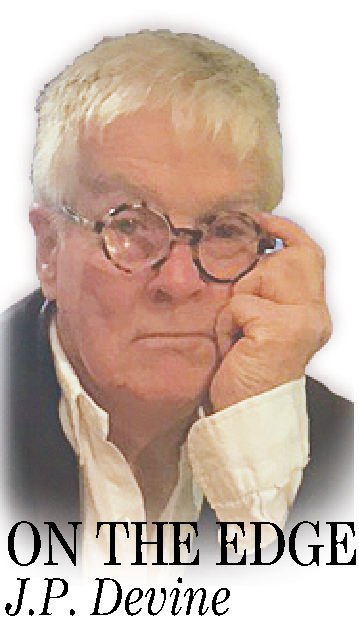“Potatoes are cheaper, tomatoes are cheaper, now’s the time to fall in love.”
— Song by Al Sherman and Al Lewis
IF MY MATH is correct, I think I was about 5 when my mother took me to the movies with her on a hot summer night, to see a musical that had just opened, “Born to Dance,” with Jimmy Stewart and Eleanor Powell.
Jimmy, for the first time, sang Cole Porter’s “You’d Be so Easy to Love.” Stewart had no singing voice at all, and no effort was made to cover it. Some wanted it dubbed, but wiser heads kept Stewart’s. It made grown men think, “I can do that.”
Last week I reviewed Damien Chazelle’s new, big hit musical film “La La Land,” showing at Waterville’s Railroad Square Cinema, and, like most critics and audiences, fell in love with it. When Ryan Gosling and Emma Stone, nonsingers, sang, we fell in love with them.
Since it opened, “La La Land” has gone viral all over the country, recently winning seven Golden Globes, and I just wanted you to know why.
This isn’t a double-dip review. The film, soaring as it is, doesn’t need it. It’s just that as I sat through it, I felt some familiar throbs and twinges out of the past. I knew it was going to be a major hit, not just because it’s beautifully made and expertly done. It’s because of the timing; it’s because of who we are and where we are.
We’ve been here before; we’ve danced in the dark before, in 1941; and when the sun came out four years later, we were still here, still dancing and singing; and Hollywood, despite the tone-deaf Republicans’ badmouthing of it, was responsible.
During the depression and World War II, Mama took her baby boy to the movies almost every night in the summer.
Each bill in those days came with a double feature, plus Tom and Jerry and a sing-along short.
Of course there were the newsreels on the bill, and singing and dancing was in short supply. Hitler was rising in Germany, and parents here were getting scared and depressed.
Food on the table began to shrink; men were losing their jobs. My father was still serving as an officer in the Navy Reserve, so we weren’t hurting that much, but dozens of his school chums were. It broke his heart to see family men in their 40s standing in the bread lines.
There are still many of you who remember with pained hearts the decade of that time, and what you and your parents did to survive, to wash away the blues and keep food on the table and smiles on their faces. Movies did that. The great American musical — an art form Hollywood invented, packaged and put out there — did that.
Movie studios were churning out movies at the rate of 50 and 60 movies annually. That’s how the double feature came into being, and the hottest favorites came from Metro-Goldwyn Mayer, because they made the best musicals: “The Wizard of Oz,” “Babes In Arms” and “The Great Ziegfeld,” and they kept them coming all through the darkest years of the war.
For some it was a dime or 25 cents a ticket. If it was a choice between a hamburger and a Technicolor musical, that was hard.
My own personal story? At my father’s wake, I sat on a chair in a corner while a cloud of adults walked past me to the kitchen. Some, feeling sorry for me as they passed, would put a dime or nickel, a quarter in my hand. Around 7 in the evening, I had collected a couple of bucks.
I got up, walked down to the Michigan Avenue Theater, plunked down a dime and sat through Walt Disney’s musical “Pinocchio,” a musical fantasy about a little boy who got separated from his father. Take that to the shrink.
When I was finally missed, some went looking for me. My sister Rita knew where I was and found me, sat down and finished the movie with me. Thank you, Rita.
Those were dark times, and they got darker. It was 1945 before the sun came out again.
For millions of us, the political sky over America has grown very dark. But this week, the magical “La La Land” has opened nationwide, and people are falling in love again with color and light, song and dance, with Boy meets Girl, Boy loses Girl, Boy finds Girl again. What was that “Annie” sang? “The sun’ll come out tomorrow.”
In the meantime, go to the movies and fall in love again.
J.P. Devine is a Waterville writer.
Send questions/comments to the editors.


